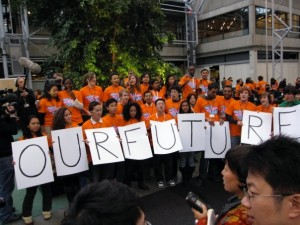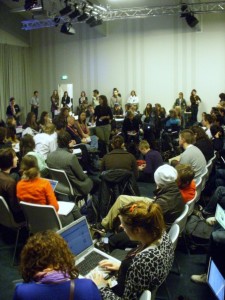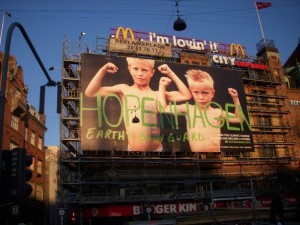Coming out of Copenhagen I was overwhelmed. I am still overwhelmed. Climate change is so much more complicated than I could have ever imagined. This is an issue of population, energy use, consumerism, economics, faith, culture, politics, science, and so much more. I cannot fathom the best method for connecting all of these pieces or which piece deserves the most immediate attention and action.
However, being a 19 year old, there was one thing that crystal clear to me after Copenhagen: whatever solution comes out of the next few COPs, my generation be the one who will have to live with it; we will be the one who will feel the effects of climate change.
There were over 2,000 youth at this conference, 500 being from the United States. The youth worked with the Least Developed Countries (LDCs), uniting over the fact that we will feel the effects of climate change the most. We worked to urge governmental delegates to recognize the need for strong and immediate action. If anything, our presence there reminded the politicians of the faces who will be affected by their decisions and how much the youth care about the world we are going to live in.
On most mornings, I would wake up early to go to the YOUNGOs meeting. They were high in energy and very organized and efficient. At YOUNGO meetings, each group would send a representative of their delegation to sit in a circle in the center of the room. Everyone else watched from the outside. The center circle made decisions on talking points so that all the youth could send a stronger, more unified message. By working with the LDCs, we were able to have our message heard by the negotiators at the plenaries as well. Once consensus was reached, the youth would all put their hands up and wave; this was a sign of agreement. I was amazed to see how quickly the youth from all different places in the world could reach consensus.
In contrast, the negotiations held in the plenary by governmental delegates rarely seemed to be making any progress. Everyone came to the plenary with their own agenda and seemed very wary of compromising their own priorities for the greater good. I remember feeling frustrated towards the end of the conference when it became more and more apparent that a binding treaty was unlikely to be made. When did the youth ever give permission to the governmental delegates to make a decision about our future? Who thought this negotiating process was a good idea? Why isn’t there a youth voice present at the negotiating table?
As much as I felt frustrated at times by the lack of control I had over the future for my generation and those to come, I couldn’t help but feel inspired by all of the amazing youth I met from all over the world. I made friends from China, France and Nigeria.
The youth were energetic, organized and able to reach consensus daily despite cultural differences. I remember standing out- side the youth briefing session, waiting to get in, chanting “I said, ohhhh, its hot in here! There must be some C-O-2 in the at-mos-phere.” Many delegates slowed down to smile at all of us chanting and one gave me a high-five : ). I couldn’t help but feel like our large presence there had to have had some sort of impact on the people making the decisions, even if it was just to remind them of their own children who will feel the effects of climate change. I am curious to see how the YOUNGOs role in the negotiations will evolve and what kind of impact they will be able to have in the COPs to come. It seems only ethical to let the youth have a bigger stake in the negotiations.
Tags: climate change, coalitions, developing countries, Dickinson College, Grace Lange, Kyoto to Copenhagen, Public Policy, student-citizens


